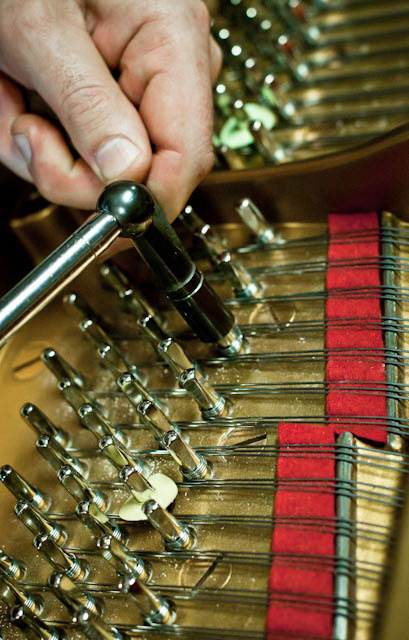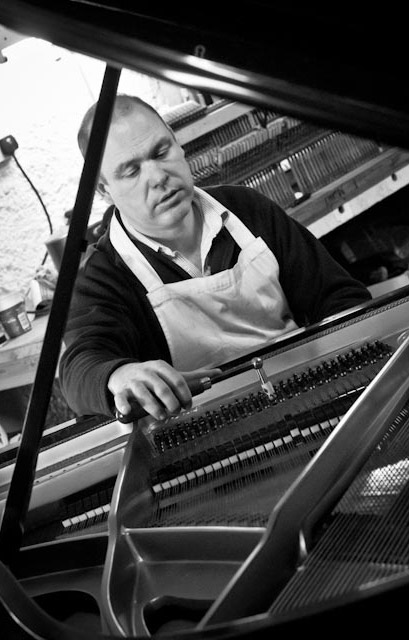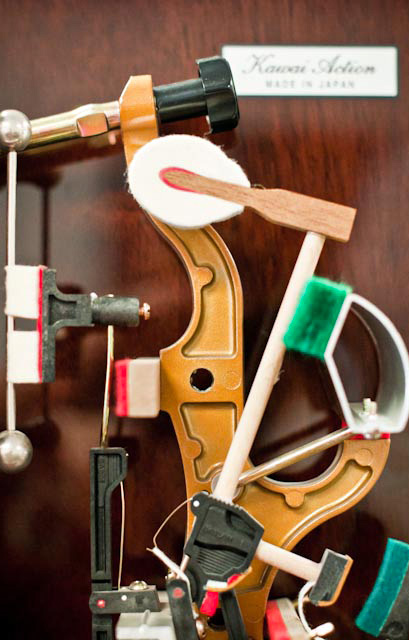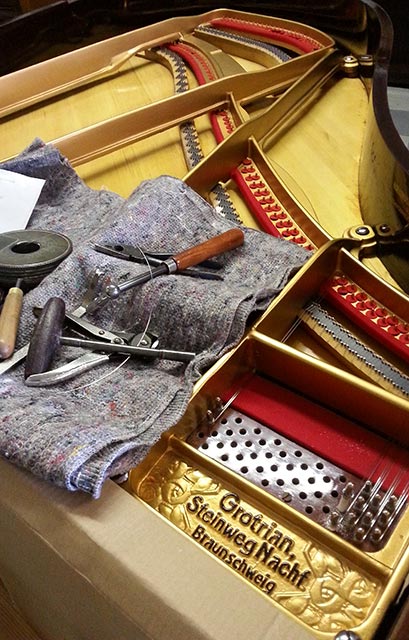Piano Care
Grantham Piano Services offers
advice on looking after your piano.
A family company, established in 1972.
Piano Care and Advice
The piano is among the most versatile of musical instruments, but it is also one of the most complex and delicate. Pianos are built with a combination of traditional craftsmanship and advanced acoustic technology. But even the finest instrument needs proper care to give long life and dependable service. We have outlined our advice below for caring for your piano, built from many years’ experience restoring, repairing and tuning pianos.
How often should a piano be tuned?
Pianos are delicate instruments which need professional attention periodically. There are two types of professional piano care: tuning and adjustment.
Piano tuning is done to correct the pitch of every note by retightening the strings. The strings need to be tuned once or twice a year to restore them to their proper tension. Adjustment involves the entire piano action, keyboard and pedal movements. Proper adjustment is especially important for grand pianos. Whether the piano will perform properly or not depends on how accurately the adjustment is made.
How do I clean the keys?
Here are some of the things people have told me that they clean their keys with, which always make me chuckle: Toothpaste (its good for teeth, why not for ivory?) Methylated spirit (don’t smoke whilst doing this!) white spirit, lemon juice, neat alcohol, nail varnish remover (really? Yes, really…) and by far the most heard one and the most unbelievable – milk (I think it’s because it’s white, I’ve never heard of the magical cleaning power of milk before, but I hear this more than anything else, can you imagine the smell after 3 days!
The actual best thing to clean your keys is a soft cloth dipped in washing up water, wrung out until just damp, clean the individual key with your finger in the cloth, following up behind with a dry cloth to finish, easy. Try to avoid playing the piano with dirty hands.
Where Should I Put My Piano?
The general advice here is: in a room that is stable in terms of humidity and temperature. Pianos hate change, rapid temperature and humidity change plays havoc with a pianos tuning, pianos are based on a wooden frame, so they expand and contract according to the air around them, so, if that is constantly changing, so is your piano and they don’t like it.
Avoid Direct Sunlight and Draughts
Keep your piano out of direct sunlight. Pianos in direct sunlight get hot, very hot. If you have piano in the blazing sun, just place your palm on the sunlit area and feel the temperature, pretty hot eh? Also, the casework of a piano in the sun gets sun-bleached very quickly, the sun just leaches the colour from it and that can turn out to be either expensive, or, irreparable.
Pianos don’t like draughts. Again, try to keep the piano in a stable environment.
Never Up Against a Radiator
Never put a piano up against a radiator. Not one that’s turned on, anyway! You would think that this advice is pretty obvious, but you would be surprised…again, it’s about the humidity. Central heating systems dry the air and a piano up against a radiator will shrink it down quickly, the tuning will be first to go, followed by the soundboard, followed by other structural parts of the piano.
Provide Ventilation and Avoid Damp Rooms
Keep your piano out of very damp environments. Certain parts of the piano prefer a more humid environment, like the wooden frame and the soundboard and the wrest plank, but, the action does not like the damp. Within the action are thousands of moving parts, requiring very fine tolerances of movement. Dampness seizes action parts up, dampness swells up the keys. Whenever I’m tuning and I come across seized up parts, its generally because the room is too damp, or there is not enough airflow in the room.
Put Your Piano Where it Sounds Best
Your piano should be placed in a room where the sound will be evenly distributed. A room where all the sound gathers in one spot will produce sound lag and echoes. The best room for your piano is one in which its sound will reverberate to produce pleasant, full-bodied tones without harsh echoes.
Don’t Place Objects on Top of the Piano
A heavy object may cause poor tone or noisy vibrations if placed on the piano. A vase of flowers may look attractive on the piano but if it should spill and water enter the piano serious damage can result. Water will rust the metal parts of the piano and damage the hammer and action. Avoid costly accidents and never place anything except sheet music or a metronome on the piano.
Sometimes it is not possible to satisfy all these requirements above when placing a piano in the room, John, of course, can help you with the positioning of your piano to get the most out of it, just give him a call.





